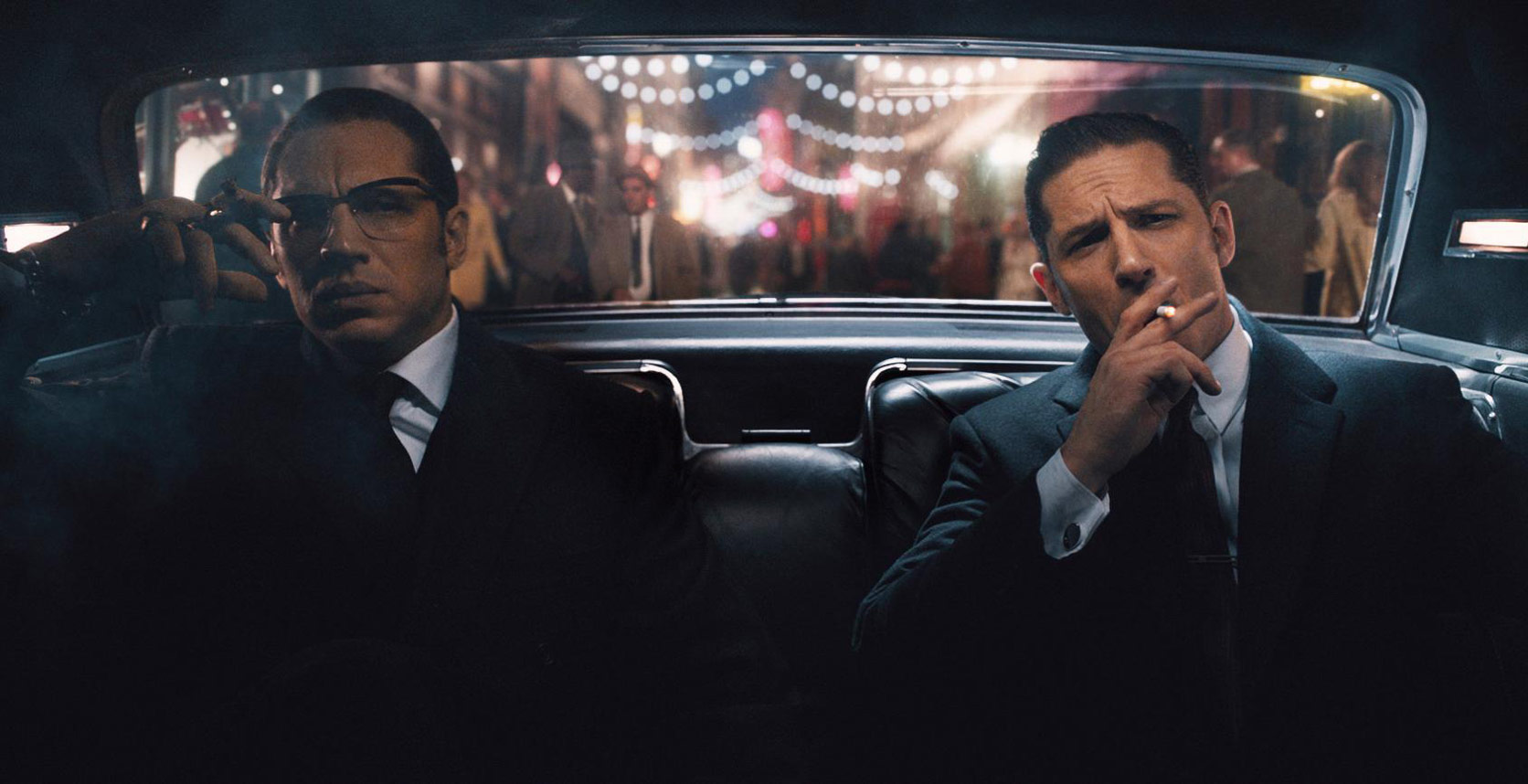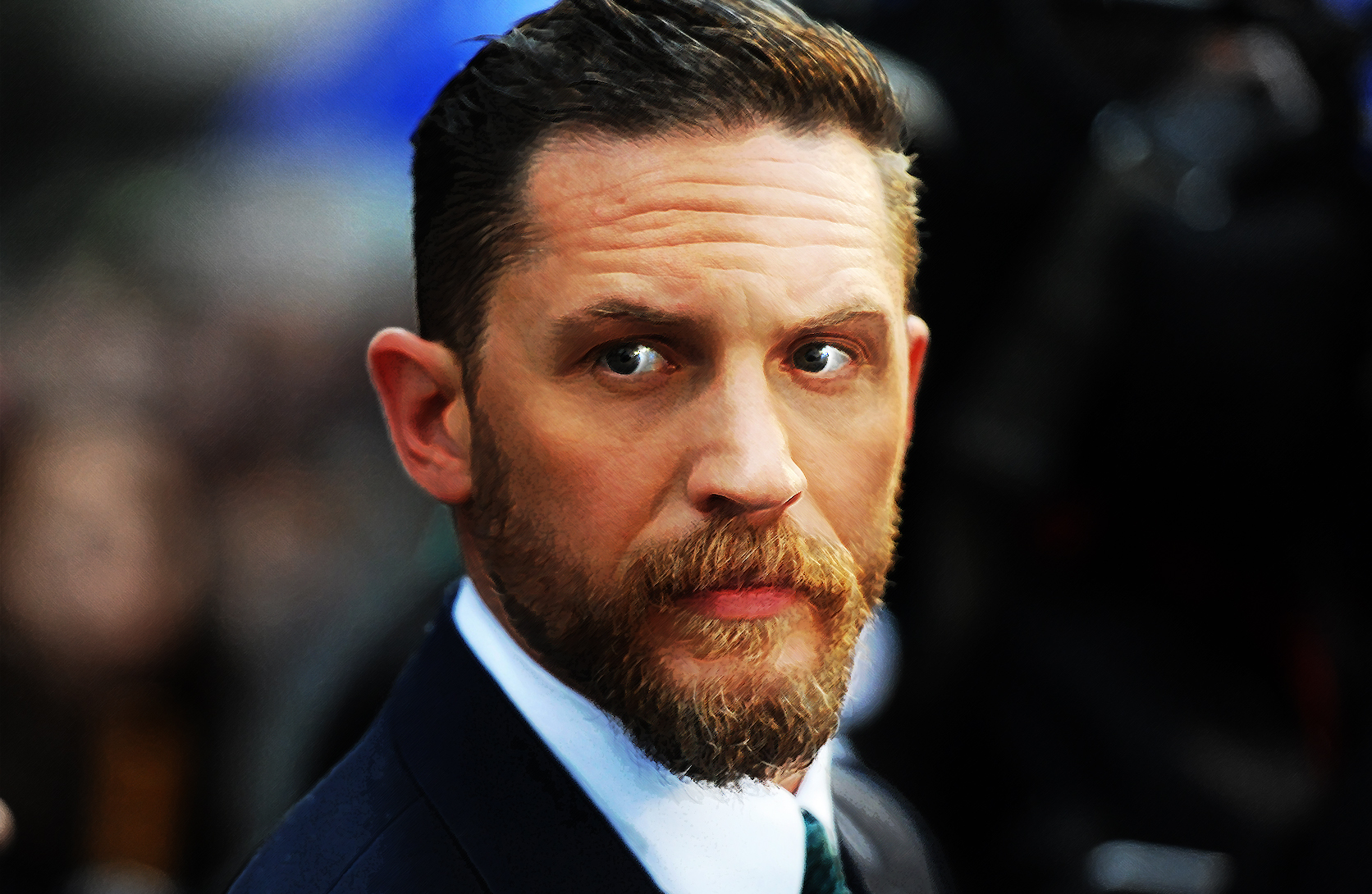You’re Afraid of Tom Hardy Because You’re Afraid of Manhood
Tom Hardy is sitting in his wife’s rocking chair, talking about his work.
It’s furniture that she will be using a lot in the near future to feed and console their impending baby. But, since the kid hasn’t come yet, Hardy’s there, rocking beside his dog. Maybe the dog is in his lap. He’s calling from England, so I can’t get a clear visual. The point is: there’s a dog. With Tom Hardy, there is always a dog. It’s pop culture scripture at this point, like Michael Jackson and sequined gloves or Johnny Depp and odd hats. Tom Hardy likes dogs.
And dogs like him. Know why? Because, as man’s best friend, dogs recognize that Tom Hardy is someone to latch on to. Basically, Tom Hardy is the Ideal Man. And so, the logic is, the better the man, the better the friend. Dogs sense this kind of thing instinctively. And, while we might not be as good at it as they are, nor as open about it, other men sense this kind of thing, too. There’s something about Hardy that pulls us in, magnetic, but in a decisively un-showy way. Frankly, it’s hard to put your finger on how we reach this conclusion, but some animal part of our brains seems to have decided that Hardy is everything men want to be. Yeah, that line gets thrown around a lot with male actors, but that’s more about an actor’s persona, or the characters they play. As elusive as Hardy can be, there is just something übermensch-y about him.
Yes, it’s a hyperbolic statement, which could easily come off as fawning — something that, ironically, Tom Hardy would never be — and thus, requires some study to back it up. That’s what we’ll be doing here.

It should be said: Hardy would almost certainly disagree with this assessment. While he’s rocking, he’s telling me about the IKEA furniture he had to build recently. And how it was impossible. “It’s like a massive bowl of spaghetti. It’s great at first, but then it keeps going and going, and you’re sure it was light out when you started eating it,” he says. “You start out all positive. But then my wife has to come in and finish it.” The furniture, he means, not the metaphorical pasta.
Which reminds him: “Monkey?” he calls to his wife, “Am I good at anything manly?”
“You’re a good protector,” she says. “I always feel safe with you.”
“There you go,” he says, mock-triumphantly, “I’m a protector.”
And really, given the choice, what would you rather be good at? Protecting your kin, or the ability to read vague Swedish illustrations in order to survive the hellish tribulation of flat-pack furniture assembly? Wouldn’t the Ideal Man be good at both, you wonder? Well, sure, maybe. But, nobody is claiming that Tom Hardy is a god.
There is a good chance we’re projecting; that when the case for Tom Hardy being the kind of man every one of us aspires to be, we’ll have only succeeded in highlighting common insecurities among the typical man. But, isn’t that how most men become famous? They tap into some aspiration we secretly, or not so secretly, share; they fill a void. Their success is directly correlated to the degree by which they align with our imagined, perfected self. It’s why celebrities are put on the cover of magazines, and why men then buy said magazines. We want to have our suspicions confirmed, not just that James Bond is cool, for instance, but that the man playing him is, too.
This brings up one of the interesting things about Tom Hardy. Where most actors ascend to their position through a mixture of talent and personal branding — who they are on-and off-screen — Hardy’s rise has very little to do with his personal life. He doesn’t much care for discussing it. You could argue that eschewing personal questions is his personal brand — that it’s as much part of the game as any actorly persona — but with Hardy, it works because it feels utterly, incomprehensibly genuine. Real realness. It isn’t just that he wants to seem mysterious, or serious. It’s that he honestly doesn’t understand why anyone would care about anything else other than his work. The number of times he’s told reporters that his life is boring is telling. It’s so at odds with an industry that now considers the size of an actor’s Twitter following before casting them, that it’s almost a miracle Hardy is famous at all. It’s a testament to his skill.
For him — and for us — it’s all about his work. And, most especially, what we can infer about who he is from his work and how he goes about it. It’s the difference between a movie star and an actor. Show, don’t tell. One can learn about a man by examining his history and his statements about it, but that ultimately seems too subjective. Tom Hardy is a man who understands that he is judged by his work, and so goes about working. That’s manhood.
Plus, it’s not that he hasn’t ever talked about his past; it’s that, as interesting as his personal history is to people who didn’t live it, it’s boring for him now — the way our pasts probably should be for us. Move on, live now. Avoiding boredom is a big thing for Hardy. Fear of it is, perhaps, his biggest motivator.
“Be great, or be just awful, complete rubbish. But don’t be boring,” he says. “That’s the fucking worst.” It’s only a little surprising. In an old interview, he mentioned that humiliation was the greatest danger for an actor. He’s being consistent. He makes it clear that being seen as mediocre or dull would humiliate him. Imagine if we all conflated medi- ocrity with humiliation: workplace productivity alone would skyrocket. You, at your desk, don’t you wish that was you?
That being said, it isn’t hard to exhume his history: born into privilege in London, he rebelled. He was saved by acting; was trained at the same Whiplash-style school that birthed fellow serious-minded actor Michael Fassbender, who was a year or two ahead of him. After, he got a taste of success, but then liked the taste of addiction better. There were hard drugs. And then there was recovery. Now, there is the work. And it damn well better be exciting.
Two things will surprise you about Tom Hardy, should you ever talk to him. The first is his voice. Intellectually, you know he isn’t going to sound like Bane, whose voice he based on a man named Bartley Gorman, a brawling Gypsy King he saw on YouTube. You also know he won’t sound American, though he has that accent down, too. In fact, the more of his films you see, the harder it becomes to imagine what he will sound like off-screen. Hardy inhabits his characters fully. He makes bold choices that aren’t strictly necessary, but turn out to be essential.
I tell him that a few nights before, I watched Locke, which takes place entirely in a car, the camera only moving away from Hardy’s face to show brief shots of the road, or the BMW’s Bluetooth phone system. It’s riveting — the story of a man choosing his principles as his life falls apart — and it’s completely Hardy’s. Nothing in the script calls for Ivan Locke, the man Hardy inhabits, to have a Welsh accent. It’s a choice he made after spending time with a guide in Afghanistan who’s voice kept Hardy as relaxed as possible in dangerous situations. He slips into it while he’s talking to me, like a party trick, tells me that whenever he needs to calm people down, he’ll use that voice.
But his actual voice is much more casual. He sounds young. British (obviously) in the way people who try to imitate British voices sound. It’s not the lost, vaunted accent of an actor who’s rubbed away the traces of his roots. It’s disarming in its regularity, surprising only because you never hear him use it.
Along with stories of his troubled past, what people tend to talk about when they talk about Hardy is a sense of danger. You see it in nearly every role he takes — including and especially in the upcoming Legend, where he plays twin gangsters Reggie and Ronnie Kray (“Playing a dual role like that was a bucket list thing,” he says). You see it, too, when he’s confronted with a question he doesn’t care to answer, like when he was asked about his sexuality at last year’s TIFF press conference. He also has tattoos, loads of them. Pals around with military types and knows how to shoot guns. See, dangerous. But his laugh is keening, mischievous, without an edge. It’s a hooting invitation to partake in the can-you-believe-this-is-happening revelry of whatever story he’s just told. Like when he was working with a man on a role and began mirroring his behaviour so acutely that, without irony or farce, he started dressing like him. “I even put a pen in my pocket the same way he did,” he says. And laughs.
The laugh, and the messy accent, don’t undermine his seriousness though. They enhance it. It’s a balance you strive for as a man, knowing exactly when to be light, but not light-minded, engaging and endearing, but never needy. Work is serious. Manhood is serious. But, we’re all lucky as hell, too.
“I keep a small social circle,” he says. “A very small social circle. I know how to have small talk at parties when I need to, but I’m much happier by myself.” He’s an introvert, he says, and it might be the least surprising bit of trivia about Tom Hardy. Better to observe people. “But you don’t judge,” he clarifies.
Suddenly, he sounds like a father — which he is: second child on the way — giving advice: that you can want to be alone, that the important thing is to be open-hearted, maybe even kind. “And it’s OK to tell someone to fuck off. When they need it, it’s right to tell someone to fuck off. The best thing is to tell someone to fuck off, then bring them a cake the next day,” he laughs. “Because they needed to hear it.”
But while observation is essential to his craft, it’s nothing if he weren’t so good at incorporating what he sees into his performances. “The trick is to find something that works, then being careful not to rely on it too much, so that it becomes a cliché,” he says. Clichés are big for Tom Hardy, too. Because they’re boring. Lazy. And Tom Hardy isn’t lazy. “If it’s not important, then why am I doing it? Have I exhausted every option? Have I tried everything? What have we done? The work doesn’t stop. There are no answers.”
And yet, in itself, that philosophy is an answer to so much. It’s the lesson that Tom Hardy teaches us every time he walks on screen in any film. That’s how you avoid humiliation. It’s how you inhabit your roles, and do your work. It’s how you stay serious, and have a laugh, too. You never stop working. You ask questions. You listen, observe, and keep your friends close. It’s how you manage to protect your family. That’s how Tom Hardy stays Tom Hardy.
That’s how you become a man.










